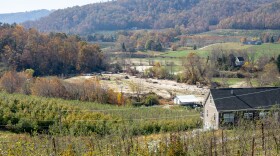When Hurricane Florence dumped record-breaking rains on North Carolina last year, poultry farmers took a hit. An estimated 4.2 million chickens and turkeys died in floodwaters.
Disposing of that many dead birds posed a significant challenge, but farmers, state agriculture officials, and researchers were able come up with a workable solution: Composting the carcasses on site.
"From a safety perspective, it's the preferred method to deal with these amounts on site," said Mamoud Sharara, an N.C. State University professor and extension agent who specializes in animal waste management. "The actual composting process itself is relatively quick and doesn't require a lot of intensive energy inputs, so it is suitable for different farms."
The key, said Sharara, is to make sure the compost piles reach and maintain an internal temperature high enough to kill off any pathogens.
Following Florence, the N.C. Department of Agriculture and Consumer Services was able to coordinate with affected farmers, truck in piles of sawdust for composting, and complete the project in just 35 days, according to Assistant Commissioner for Consumer Protection Joe Reardon.
He says farmers can now put that compost to good use.
"You can take that product and then reapply it to the farmland, and it actually adds nutrients back," said Reardon. "We think that's a real benefit to the farmer. It does protect the environment, it also protects public health, and at the end of it, you have a product that you can re-introduce to the environment that is safe and has great utility."
Reardon said the composting process cost $12 million dollars, less than half the cost of other disposal methods.
The composting technique was first tried in North Carolina after Hurricane Matthew in 2016, and then on a larger scale after Florence. Reardon said his department has streamlined the process each time.
"We hope we don't have any more hurricanes, we hope we don’t have floods of this magnitude, but if we do, we want to be prepared."








